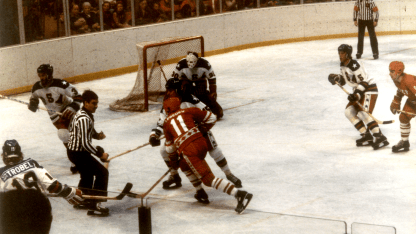Mark Wells, a member of the 1980 United States Olympics men’s hockey “Miracle on Ice” team, died Friday at the age of 67.
“It's with profound sadness to announce the passing of Mark R. Wells,” a message on his official Facebook page said Saturday. “He was so much more than an Olympic hero or ‘The Commish.’ He was a friend to everyone he met. Simply a great man.
“Please allow his family and loved ones the privacy they deserve in this time of great sorrow.”
Mike Eruzione, captain of the 1980 U.S. Olympic team, expressed his condolences on his social media account.
“Sad day today for our 1980 Olympic team. number 15 Mark Wells passed away yesterday. Great teammate obviously a great hockey player and we will miss him,” Eruzione said.
Wells, a center from Detroit, had three points (two goals, one assist) in the 1980 Lake Placid Olympics, helping the U.S. win the gold medal with a stunning win against the Soviet Union in the first game of the medal round, and a win against Finland in the final game.
His goals came in a 5-1 win against Norway and a 7-2 win against Romania in the preliminary round.
In 2018 he told WPTV in West Palm Beach, Florida, that he was injured during training camp for the Olympics and didn’t think he would make the team. But two weeks before the Games, coach Herb Brooks called him.
“He called me back at the last minute because of the fact of my speed,” Wells said.
Wells was selected by the Montreal Canadiens in the 13th round (No. 176) of the 1977 NHL Draft after his second season at Bowling Green State University. After the Olympics, he played nine games for Nova Scotia, Montreal’s American Hockey League affiliate, but was traded to the Detroit Red Wings. He refused to join the Red Wings and was released from his contract.
He then signed with the New York Rangers, but never made the NHL, playing the 1980-81 season with New Haven, the Rangers’ AHL affiliate, where he had 43 points (14 goals, 29 assists) in 67 games. In 1981-82, he played 19 games with Fort Wayne of the International Hockey League, six games with Flint of the IHL and 14 games with Oklahoma City of the Central Hockey League.
After not making the U.S. team for the 1983 World Championships, he returned to Minnesota where he became a restaurant manager, but back problems caused him to retire early. The back problems were actually a spinal cord disease that left him bedridden.
In 2010, needing money for his medical issues, Wells sold his gold medal at auction.
"It killed me to sell the medal. Killed me. But my life was crumbling,” Wells told the New York Daily News in 2010. “I was going to lose my home. I needed to sell it to have surgery and to live. I had no choice."


















